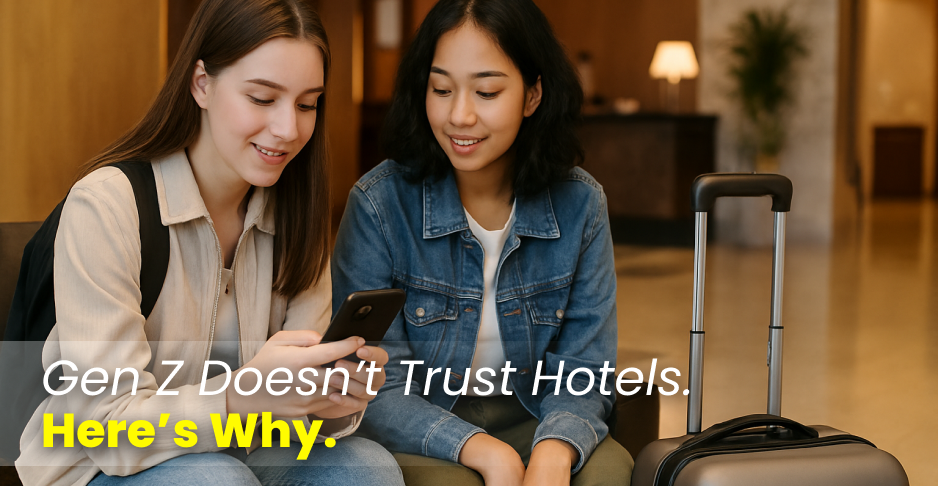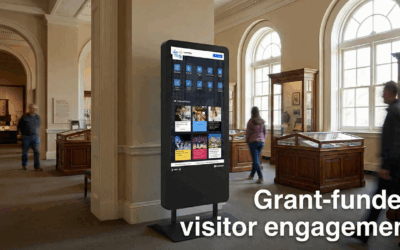The Trust Crisis Hotels Can’t Ignore
Walk into any hotel lobby today and you’ll see it: a line of guests waiting at the front desk, staff buried in paperwork, and a few impatient travelers scrolling their phones. Among them is a Gen Z guest — let’s call her Aisha, 24 years old, fresh from a weekend of TikTok travel research.
Before Aisha even hands over her ID, she’s already decided whether she’ll trust this hotel again. She’s checked reviews on Reddit, compared your sustainability claims with comments on Instagram, and seen what influencers say about your brand on TikTok.
And here’s the kicker: Aisha doesn’t trust you yet.
Gen Z (born 1997–2012) will soon account for a third of global tourism spend by 2030. Yet they are also the most brand-skeptical, digitally demanding, and authenticity-driven generation hotels have ever faced.
For hoteliers, this isn’t just a generational quirk. It’s a looming trust crisis — and the winners will be the businesses that figure out how to bridge it.

What Drives Gen Z’s Distrust?
1. They Grew Up Distrusting Corporates
Gen Z was raised during the era of corporate scandals, fake news, and social media “authenticity theater.” They know polished ads can’t be trusted.
- 70% of Gen Z trust user-generated content more than branded content (Deloitte).
- TikTok hashtags like #hotelreview (1.2B+ views) and #airbnbcheck (850M+ views) are their go-to sources for travel truth.
For them, a hotel’s Instagram ad is less credible than a shaky iPhone video from a stranger.
2. Slow Tech = Outdated Brand
Gen Z’s lives run on Face ID, instant payments, and on-demand everything. When hotels still ask them to:
- Stand in line for check-in
- Fill out paper forms
- Call the front desk for Wi-Fi passwords
…it signals something bigger than inefficiency. It signals a brand that’s out of step with their world.
3. Hidden Fees Feel Like Betrayal
Gen Z is financially cautious. They’ve grown up in the shadow of economic instability, student loans, and rising living costs. When they discover “resort fees” or tricky cancellation policies, they don’t just shrug it off — they feel cheated. And they’ll make sure others know about it.
4. Sustainability Without Action = Dishonesty
Gen Z is the most eco-conscious generation yet. But they don’t trust claims; they want proof.
- 65% of Gen Z are willing to pay more for sustainable offerings (First Insight).
- But if hotels talk “green” while handing out plastic bottles, credibility collapses instantly.
For them, trust comes from visible sustainable practices, not annual CSR reports.

The New Trust Equation
So how do hotels bridge this gap? The key is reframing hospitality as more than service + branding. For Gen Z, trust is built through:
- Automation → Convenience at every step
- Transparency → Show me what’s real
- Authenticity → Root me in local culture
- Personalization → Prove you see me, not just “a guest”
This is where digital-first tools like interactive kiosks become critical.
How Hotels Can Win Back Gen Z Trust
1. Automate the Mundane, Humanize the Critical
Gen Z doesn’t want fewer people — they want fewer obstacles. Waiting 15 minutes for a keycard is friction. Having a human solve a problem with empathy? That’s value.
👉 Solution: Install self-service kiosks to handle routine tasks:
- Check-in/out
- Wi-Fi codes
- Key issuance
- Local activity discovery
This frees staff to focus on what matters most: moments of care.
2. Make Data a Two-Way Street
Hotels collect guest data constantly. But Gen Z’s question is: “What do I get for it?”
👉 Solution: Use kiosks and apps to show personalized profiles:
- Loyalty perks
- Local recommendations
- Tailored offers
When data feels like a mutual exchange, trust grows.
3. Showcase Local Over Generic
Gen Z books Airbnbs because they feel plugged into local life. Hotels can compete if they curate local flavor instead of cookie-cutter brochures.
👉 Solution: Use digital signage to highlight:
- Local restaurants, indie cafés, street food tours
- Community events and cultural experiences
- Partnerships with small businesses
This signals: “We’re not just a building; we’re a gateway to the destination.”
4. Prove Sustainability Through Operations
Stop hiding eco-efforts in annual reports. Make them visible at every touchpoint.
Examples:
- Digital receipts instead of paper
- QR menus in restaurants
- Kiosk-based eco-friendly activity guides
- In-room dashboards showing real-time energy/water savings
Trust is earned when sustainability is embedded in the experience.
Case Studies: Trust in Action
- Amsterdam Boutique Hotel
Adopted self-check-in kiosks + digital guest profiles. Result: 40% less lobby wait time and higher satisfaction among guests under 30. - Bali Resort
Used kiosks to highlight eco-friendly tours and food. Younger guests rated “authenticity” 20% higher in post-stay surveys. - New York Chain Hotel
Integrated loyalty perks directly into kiosks instead of email campaigns. Gen Z engagement tripled.

Why This Matters for Hotels’ Bottom Line
- Trust Drives Loyalty
Gen Z switches brands twice as fast as Millennials. Without trust, they won’t return. With trust, they become lifelong customers. - Trust Drives Influence
Gen Z posts everything online. One trusted stay = free viral marketing. - Trust Drives Direct Bookings
Personalization + transparency reduce OTA dependence and protect margins.
Hotels that embed digital-first trust strategies report up to 18% more direct bookings from younger travelers.
The Hard Truth: Adapt or Fade
Gen Z isn’t just another demographic wave. They are reshaping the economics of hospitality itself.
By 2030, hotels that fail to adapt will lose a massive share of the market to digital-first competitors who feel more transparent and authentic.
The equation is clear:
Automation + Transparency + Authenticity = Trust.
Those who embrace it will thrive. Those who don’t will watch an entire generation walk past their lobbies.




